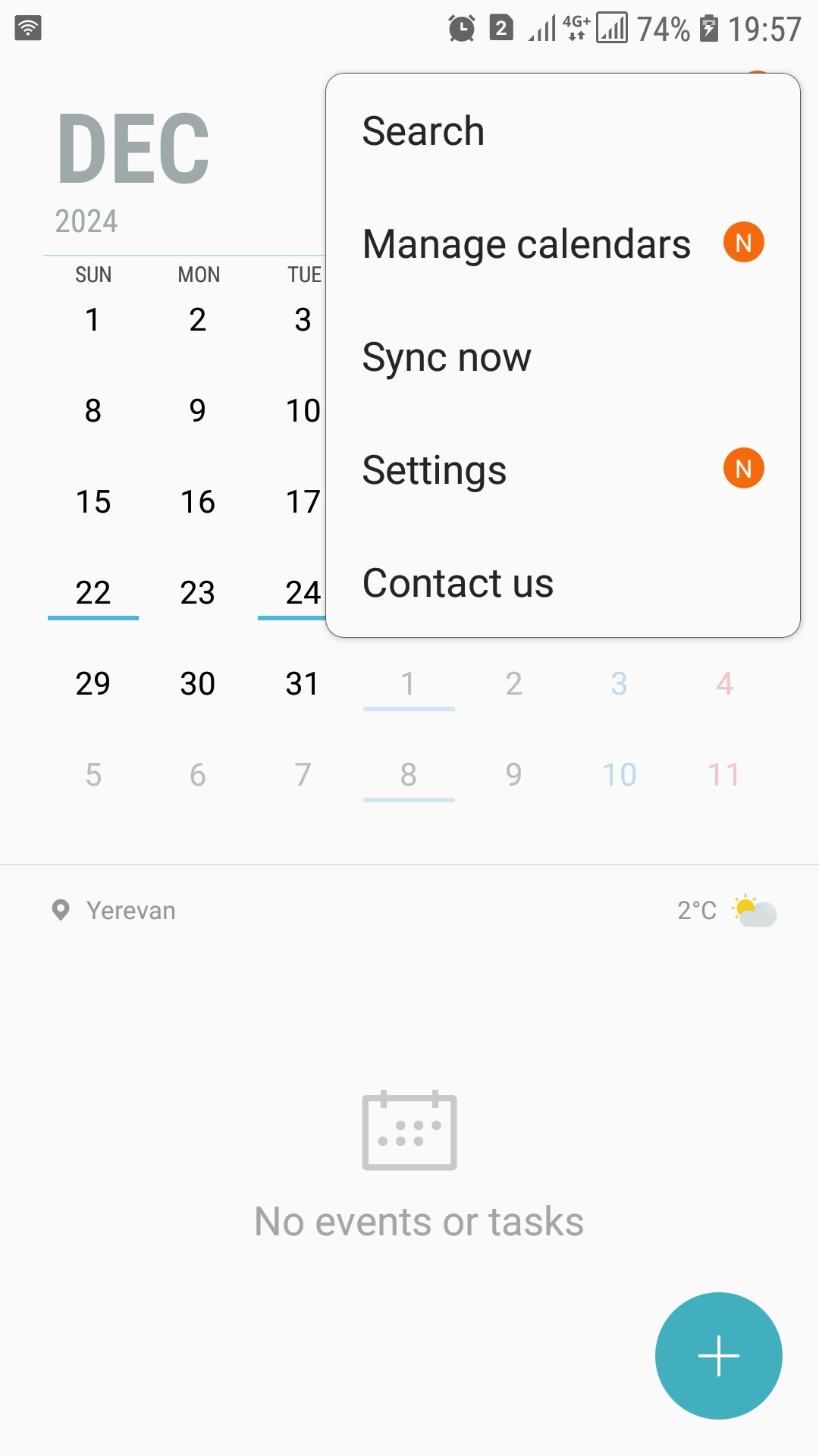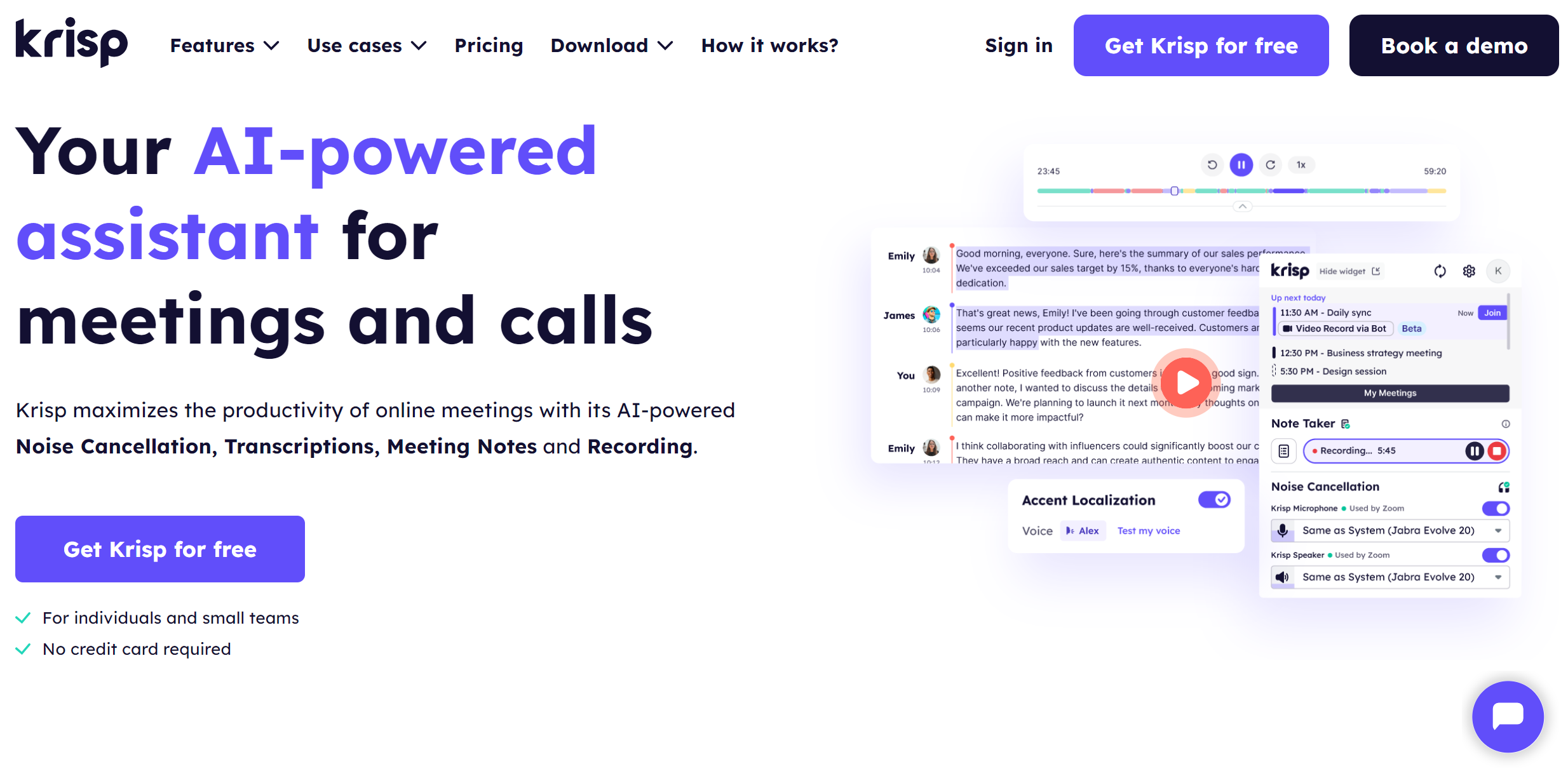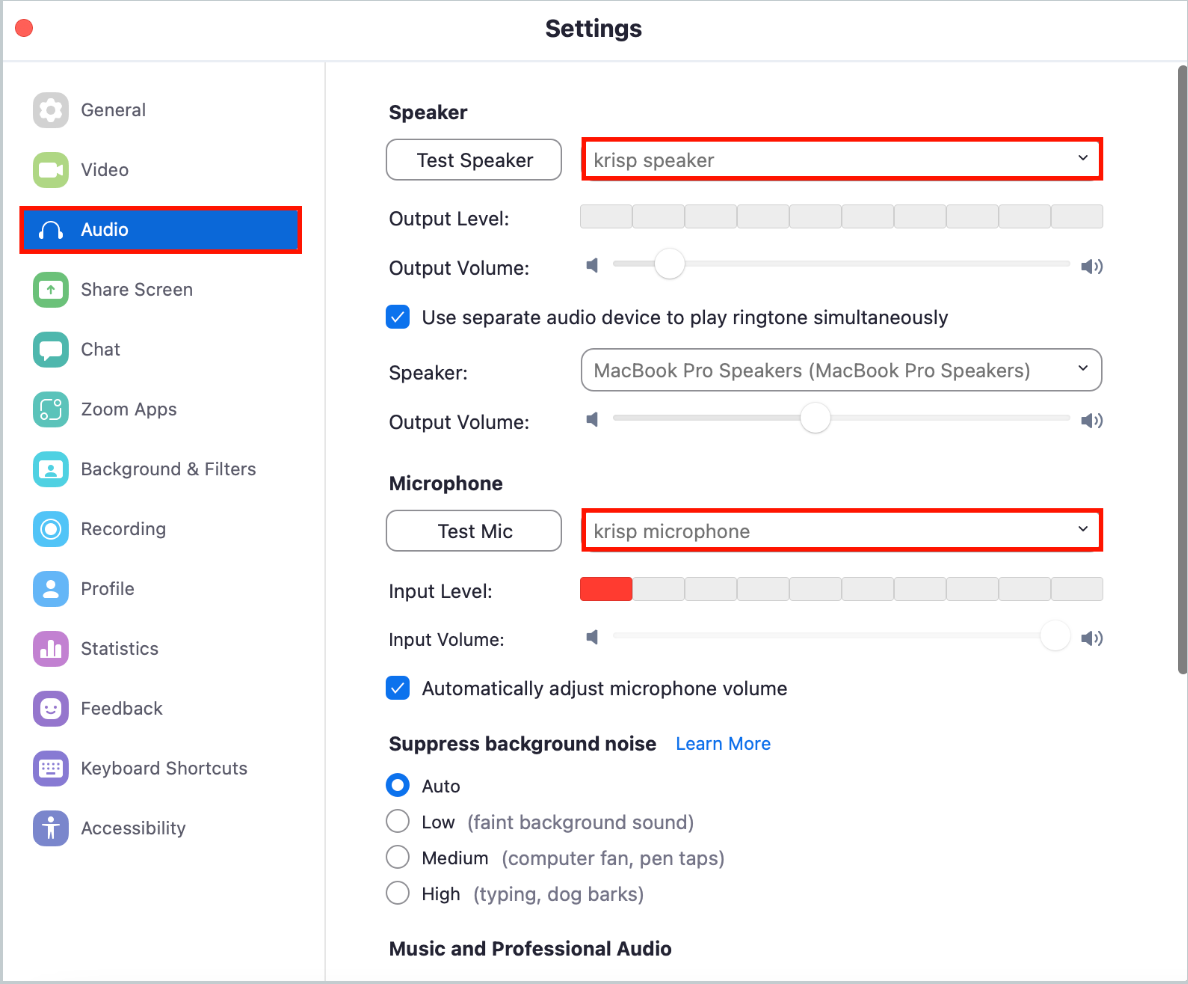Have you accidentally deleted an event on Google Calendar? How to see deleted events on Google Calendar? No worries. Losing a scheduled event can feel stressful, but you can recover or find It with simple steps.
In this guide, we’ll walk you through actionable steps to see deleted events and recover them to stay organized. Moreover, you’ll learn how the Krisp AI Meeting Assistant elevates your virtual meetings scheduled or rescheduled on Google Calendar.
Does Google Calendar Delete History?

Google Calendar doesn’t automatically delete history. Specifically, events and entries you’ve added remain saved indefinitely. However, you can manually delete these events from Google Calendar or adjust specific settings.
Moreover, you can remove old events or clear your Calendar history if needed. Additionally, you can cancel a Google Calendar event and share Google Calendar with others.
Google Calendar is a versatile scheduling app with color schemes. It offers unified access to multiple Calendars, including personal, public, and department-specific ones.
Moreover, Google Calendar supports event scheduling, task reminders, Google Meet integration, and features like Google Maps and Weather for seamless on-the-go planning.
To manage event history:
- Manual Deletion: Delete specific events by clicking on them and choosing the “Delete” option.
- Filter Events: Use Google Calendar’s search to locate and manage older entries.
- Export History: If you want a record before deleting, export your Calendar data via Google Calendar settings.
Always check your account settings for any changes that may affect event retention.
How to See Deleted Events in Google Calendar?
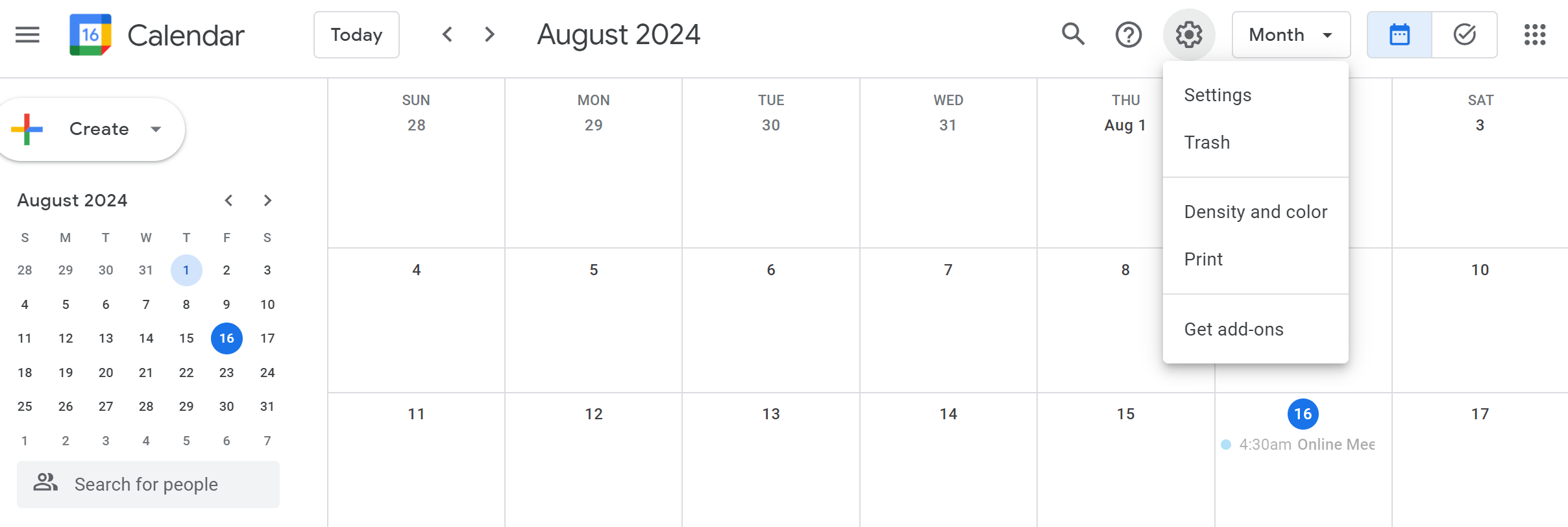
Google Calendar has no built-in trash or history view for deleted events. However, you can try these methods to recover or review deleted events:
1. Check the Gmail Inbox:
If the event was part of an invitation, search your Gmail inbox for the original invitation email. Specifically, re-accepting the invite can restore the event to your Calendar.
2. Check the Google Calendar Trash
Click “Settings” at the top right side of Google Calendar. Next, click “Trash” to see all the deleted events there.
3. Look in Shared Calendars:
Was the event on a shared Calendar? If yes, ask the Calendar owner to re-invite or confirm if they have a record of it.
4. Check the Activity Log (For Workspace Accounts):
Google Workspace admins can view audit logs for Calendar activities, including deletions, via the Google Admin Console.
5. Use Calendar Backup:
Have you exported your Calendar before deletion? If so, you can re-import the backup file (.ics) to restore the event.
How to Find Deleted Calendar Items
Do you want to know how to see deleted events on Google Calendar? While Google Calendar doesn’t offer a direct recovery tool, leveraging backups and other connected services can help retrieve deleted events.
For other Calendar apps, including Outlook or Apple Calendar:
- Trash/Deleted Items Folder (For Supported Apps):
For some Calendars, like Apple Calendar, you can use the “Recently Deleted” section to restore deleted events.
Namely, open iCloud Calendar, log into iCloud.com and access your Calendar. To retrieve deleted events from backups, go to “Settings” > “Advanced” > “Restore Calendars and Reminders.”
- Check Syncing Apps:
If your Calendar syncs with apps like Outlook or iCloud, review their trash folders for deleted items.
- Restore from Backup:
If available on iCloud or local storage, restore the calendar from a previous backup.
- Contact Support:
Contact Google Support or your Calendar app’s support team for significant data recovery needs.
How to See the History of a Google Calendar

Can you see the history of a Google Calendar? Google Calendar doesn’t offer a direct “history” view to see all past events or changes made to your Calendar. However, you can use the following methods to view historical data and changes:
- Check Past Events Directly
- Open Google Calendar on desktop or mobile app.
- Navigate to previous months or years using the arrows near the top-left corner.
- View past events directly on the Calendar grid.
- Use the Google Calendar Search
- Type keywords, dates, or event names into the search bar at the top of the Google Calendar interface.
- You’ll see all events, including past ones, related to your search terms.
- View Calendar Activity Log (for Google Workspace Accounts)
If you’re using a Google Workspace account, admins can check the Audit Log:
- Go to the Admin Console at admin.google.com.
- Go to Menu and navigate “Reports > Audit > Calendar Audit Logs.”
- Search for specific Calendar activities, such as event creation, updates, or deletions.
- Export Calendar Data
Export your Google Calendar to view a complete history of events offline:
- Go to Google Calendar “Settings” at the top of the page.
- Choose “Import & Export” along the left side of the screen and click “Export.”
- Download the .ics file and open it with a compatible Calendar app to review your event history.
- Check Email Notifications
Have you enabled email notifications for event updates or invitations? If yes, search your Gmail inbox for Calendar-related emails to track changes or past events.
- Use Google Takeout
Download your entire Google Calendar history through Google Takeout:
- Visit Google Takeout by logging into your Google Account and going to the Google Takeout page.
- Select Calendar data and download it.
- Open the file to review your historical data.
How to Find Old Events on Google Calendar?

Now that you know how to see deleted events on Google Calendar, let’s learn how to find old events on the Calendar.
- Use the Search Bar:
- Open Google Calendar.
- Type the event name, keyword, or date range in the search bar at the top.
- Press “Enter” to display all matching events, including old ones.
- Manually Browse the Calendar:
- Navigate to past months or years using the left/right arrows in the Calendar view.
- Scroll to the specific date to locate the event.
- Check Calendar Export:
- Export your Calendar via Settings > Import & Export to access older events offline in an .ics file.
How to Recover a Deleted Calendar Event on iPhone?
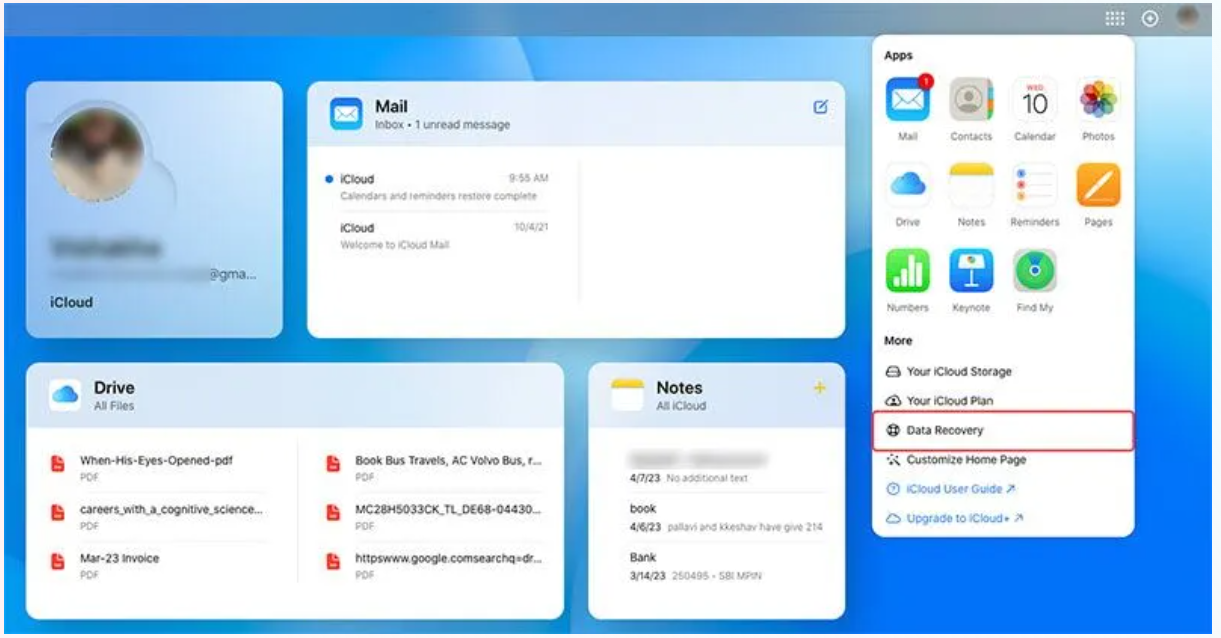
Below, you can find how to see deleted events on Google Calendar on iPhone and recover them easily.
- Restore from iCloud Backup:
- Open “Settings” on your iPhone.
- Tap on your name at the top of the Settings list.
- Go to iCloud.com.
- Access the Calendar and check for backups.
- Restore the Calendar to bring back the deleted event.
- Recover iPhone Calendar events from iCloud.com
- Opencom.
- Log into your account.
- Click“Trust” when you see “Trust/Untrust” popping up.
- Click on the nine dots and choose “Data Recovery” on the home screen.
- Tap “Restore Calendars.”
- Click the “Restore” option to restore the archive you wish.
- Confirm your choice and click “Restore.”
- Wait until the restoration is completed and click “OK.”
How to Recover a Deleted Calendar Event on Android?

Here is how to see deleted events on Google Calendar on Android and retrieve them with ease.
- Reinstall Calendar
- Access Android’s “Settings” and open “Apps & notifications.”
- Choose “Google Calendar” and then “Uninstall.”
- Access the “Play Store” and find “Google Android Calendar.”
- Click “Install” and wait until the reinstallation concludes.
- Restore Google Calendar on Android from Backup
- Access your Google Calendar account.
- Tap the “Settings” icon in the top-left corner, and the dropdown menu will appear.
- Move to the “Import & Export” tab on the left sidebar of the settings page.
- “Import” the saved backup file from your.
- Click on “Import.”
- Get the Calendar Events Back on Android via Events from Gmail
- Use your Google Account details to access Google Calendar.
- Navigate to the top left corner of your screen to tap “Settings.”
- Choose “Settings” from the ensuing menu.
- Find the “Events from Gmail” tab under “Settings” in the left sidebar.
- Ensure that the feature is enabled to display your calendar events from Gmail.
- Restore Calendar Events on Android by Clearing the App Cache
- Open “Settings” and select “Apps.”
- Choose “Calendar.”
- Click “Force Stop” and “OK.”
- Go to “Storage,” choose “Clear data,” and confirm with “OK.”
- Reopen the app and let it sync.
- Make sure you can see the events in the Calendar app.
How Krisp Enhances Virtual Meetings Scheduled on Google Calendar

We’ve already gone through the steps on how to see deleted events on Google Calendar. What about making your online meetings scheduled on Google Calendar more effective and productive?
That’s where the Krisp AI Meeting Assistant comes into play. Krisp’s AI Meeting Assistant boosts the quality of virtual meetings scheduled on Google Calendar with its advanced features like Noise Cancellation and Meeting Transcription.
Here is what the Krisp AI Meeting Assistant offers to create a seamless meeting experience:
- AI Meeting Recording with unprecedented audio quality
- AI Noise Cancellation with the most powerful noise suppression
- AI Meeting Transcription with exceptional 96% accuracy
- AI Meeting Notes & Summaries without errors
Using Krisp as a Virtual Meeting Enhancer

Using the Krisp AI Meeting Assistant alongside Google Calendar, you can make virtual meetings far more productive. Additionally, you can minimize communication barriers and maintain professionalism.
Here’s how Krisp enhances your meetings:
1. Integration with Google Calendar
The Krisp AI Meeting Assistant seamlessly integrates with Google Calendar to streamline meeting preparation. So, you can join calls with one click and automatically enable Krisp’s features.
2. Unmatched Noise Cancellation
The Krisp AI Meeting Assistant removes background noise, echoes, and voices to keep you away from unwanted distractions during virtual meetings. As a result, all meeting participants can enjoy crystal-clear audio without the need to soundproof the room.
Users note that the Krisp AI Meeting Assistant’s noise suppression algorithm is ten times more powerful than competitors.
3. On-device Recording With Excellent Audio Quality
Meeting Recording, including Screen Recording, stores your online meeting discussions so you won’t miss critical points.
Moreover, you can revisit and review your meeting discussions whenever you need to and share them with others to boost accessibility. Finally, Krisp’s AI Meeting Assistant doesn’t need to join the calls to record them.
4. Real-Time & Multilingual Transcription
The Krisp AI Meeting Assistant offers exceptionally accurate Transcription in multiple languages. Moreover, Krisp’s Import and Transcribe feature allows you to upload a meeting recording to Krisp and get the transcription. And this comes handy for offline recordings.
Specifically, Krisp’s AI Meeting Assistant automatically transcribes your meeting discussions. So you can enjoy accurate and searchable notes and save time on manual documentation.
5. Meeting Summaries and Highlights
The Krisp AI Meeting Assistant generates concise meeting summaries and action items post-meeting. As a result, participants stay aligned and focused on priorities.
Specifically, Krisp’s AI Meeting Assistant jots down critical takeaways meticulously. So, you can focus on the gist of discussions, brainstorming, and idea generation. Then, you can make minor changes if necessary and include the data in a meeting notes template.
6. Bot-less Experience
Bots are cool, but do you want them in your meetings? With Krisp’s AI Meeting Assistant, you can choose with or without bots. The Krisp AI Meeting Assistant is TIME’s top pick for note-taking apps without an in-meeting bot.
7. Superior UX
The Krisp AI Meeting Assistant is built with simplicity in mind. Do you like using complex products? It’s like following a treasure map written in hieroglyphs. Enjoy simplicity by Krisp.
8. Competitive Pricing
Krisp’s AI Meeting Assistant comes with no servers and no cloud costs. So, you can enjoy your free plan and avoid bills that others pay.
Wrapping Up
Recovering deleted events on Google Calendar can be difficult because there is no built-in recovery tool. However, you can retrieve lost information using Gmail invites, synced devices, or Calendar exports.
To avoid issues, consider enabling backups, using Google Takeout for periodic data exports, and double-checking before deleting essential events.
By leveraging these proactive strategies and using the Krisp AI Meeting Assistant, you can maintain a reliable and organized Calendar experience.
Frequently Asked Questions


